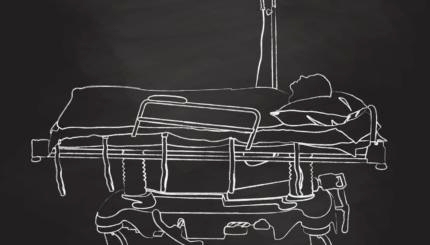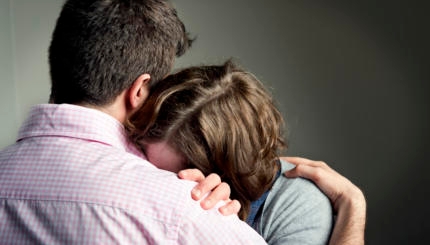“Therefore choose life” (Deuteronomy 30:19): Judaism is a life-affirming faith. Life on earth, and its benefits, are regarded as divine blessings. Their legitimate enjoyment is not only permitted but mandated. Asceticism and otherworldliness are not in keeping with the mainstream of Jewish thought and tradition.
Our joyful affirmation of the pleasures, challenges, and responsibilities of our earthly existence makes the inevitability of death the more difficult to confront. Frankly, most of us are afraid of death.
In the first place, our fear stems from our terror of the unknown–and nothing is more unknown than “the valley of the shadow of death.” We cannot imagine our own death. Our mind is incapable of portraying the emptiness, the absence of existence which some of us imagine death to be-and of identifying ourselves with that nothingness. We do not know what death is, but we are intuitively certain that it will deprive us of the companionship of those we love, and of everything we cherish and enjoy. We block it out completely. We are simply unable to confront our own death.
In the second place, our fear of death relates not only to our own demise, but to the passing of those we love. Our contemplation of their passing, and of thus being deprived of those with whom our lives are inextricably bound, is frightening in itself. Our lives will have to continue in the void created by the loss of their companionship, their love, and the reassuring security of their physical presence. Because our contemplation of their passing makes us increasingly aware of our vulnerability, we often refuse to confront the inevitable.

Help us keep Jewish knowledge accessible to millions of people around the world.
Your donation to My Jewish Learning fuels endless journeys of Jewish discovery. With your help, My Jewish Learning can continue to provide nonstop opportunities for learning, connection and growth.
Our refusal to confront the fact of death is both wrong and irresponsible.
Five Reasons For Confronting The Reality Of Death
1. Death is inevitable and cannot simply be wished away. Sometimes it announces its coming in long illness; sometimes it comes unannounced, with shattering, unexpected suddenness. But come it must, and we should be prepared to deal with the havoc it creates–calmly and reasonably.
2. The very worst time to deal with death is after it occurs. Our thinking processes are then often paralyzed by grief, and we are emotionally vulnerable. We sometimes turn for advice to those who may be unqualified to help us, and whose ignorance of proper procedure may be in inverse proportion to their good intentions.
3. The problems created by the death of a loved one are technical as well as emotional. Halakhah (Jewish law) instructs us how to conduct ourselves in the presence of a loved one whose death is imminent, and how to handle the situation when death has come. We should, therefore, be aware of appropriate procedures before they are required.
4. Burial and preparations for burial can become unnecessarily complicated. Funeral homes and directors serve observant, traditional, secular, and assimilated Jews, and are mandated to cater to all tastes and most lawful requests. Salesmen and counselors are not always familiar with the special requirements of their traditional clients [or encouraging of traditional possibilities for other clients who are not sure what they want to do]. Therefore, many “options” are offered which may not be halakhically acceptable. Both the dignity of the deceased and the interests of the bereaved are best served by prior knowledge of halakhically correct procedures.
5. The emotional disorientation of the bereaved cannot be overemphasized. How should this frightening situation be handled? What behavior is appropriate prior to the burial? How should one conduct oneself in a shivahouse? How can emotions be reoriented by traditional mourning practices? What are the differences between shiva, sheloshim,and the 12-month period of mourning for deceased parents?
Reprinted with permission from Death and Bereavement: A Halakhic Perspective, published by Ktav Publishing.
Sign up for a Journey Through Grief & Mourning: Whether you have lost a loved one recently or just want to learn the basics of Jewish mourning rituals, this 8-part email series will guide you through everything you need to know and help you feel supported and comforted at a difficult time.
Looking for a way to say Mourner’s Kaddish in a minyan? My Jewish Learning’s daily online minyan gives mourners and others an opportunity to say Kaddish in community and learn from leading rabbis.


